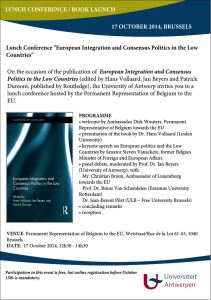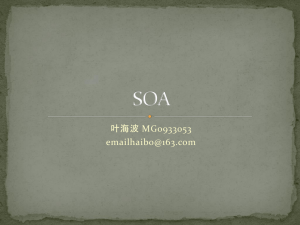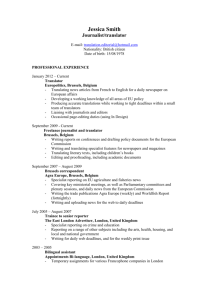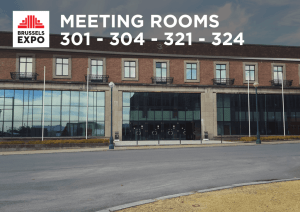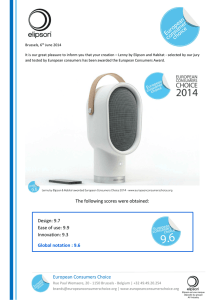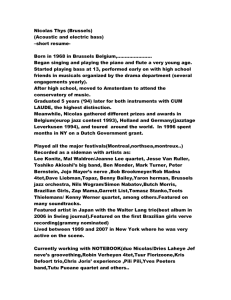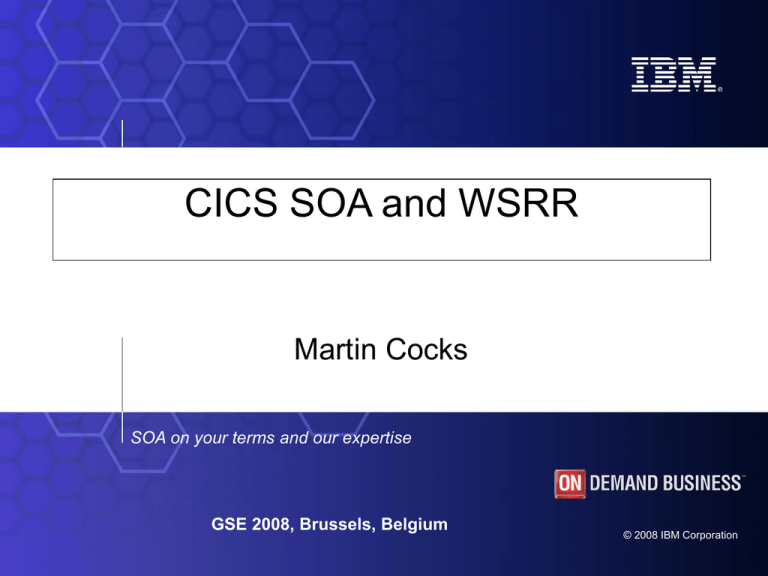
Click to edit Master Title style
CICS SOA and WSRR
Martin Cocks
SOA on your terms and our expertise
GSE 2008, Brussels, Belgium
© 2008 IBM Corporation
GSE 2008, Brussels, Belgium
© IBM Corporation 2008. All Rights Reserved.
The workshops, sessions and materials have been prepared by IBM or the session speakers and reflect their own views. They are
provided for informational purposes only, and are neither intended to, nor shall have the effect of being, legal or other guidance or
advice to any participant. While efforts were made to verify the completeness and accuracy of the information contained in this
presentation, it is provided AS IS without warranty of any kind, express or implied. IBM shall not be responsible for any damages arising
out of the use of, or otherwise related to, this presentation or any other materials. Nothing contained in this presentation is intended to,
nor shall have the effect of, creating any warranties or representations from IBM or its suppliers or licensors, or altering the terms and
conditions of the applicable license agreement governing the use of IBM software.
References in this presentation to IBM products, programs, or services do not imply that they will be available in all countries in which
IBM operates. Product release dates and/or capabilities referenced in this presentation may change at any time at IBM’s sole discretion
based on market opportunities or other factors, and are not intended to be a commitment to future product or feature availability in any
way. Nothing contained in these materials is intended to, nor shall have the effect of, stating or implying that any activities undertaken
by you will result in any specific sales, revenue growth or other results.
Performance is based on measurements and projections using standard IBM benchmarks in a controlled environment. The actual
throughput or performance that any user will experience will vary depending upon many factors, including considerations such as the
amount of multiprogramming in the user's job stream, the I/O configuration, the storage configuration, and the workload processed.
Therefore, no assurance can be given that an individual user will achieve results similar to those stated here.
All customer examples described are presented as illustrations of how those customers have used IBM products and the results they
may have achieved. Actual environmental costs and performance characteristics may vary by customer.
The following are trademarks of the International Business Machines Corporation in the United States and/or other countries. For a
complete list of IBM trademarks, see www.ibm.com/legal/copytrade.shtml
AIX, CICS, CICSPlex, DB2, DB2 Universal Database, i5/OS, IBM, the IBM logo, IMS, iSeries, Lotus, OMEGAMON, OS/390, Parallel Sysplex,
pureXML, Rational, RACF, Redbooks, Sametime, Smart SOA, SupportPac, System i, System i5, System z , Tivoli, WebSphere, and z/OS.
Java and all Java-based trademarks are trademarks of Sun Microsystems, Inc. in the United States, other countries, or both.
Microsoft and Windows are trademarks of Microsoft Corporation in the United States, other countries, or both.
Intel and Pentium are trademarks or registered trademarks of Intel Corporation or its subsidiaries in the United States and other
countries.
UNIX is a registered trademark of The Open Group in the United States and other countries.
Linux is a registered trademark of Linus Torvalds in the United States, other countries, or both.
Other company, product, or service names may be trademarks or service marks of others.
3
GSE 2008, Brussels, Belgium
Objectives
Understand the value of using a Service Registry and Repository
– The value of SOA
– The importance of SOA Governance
– The value of Meta-data
WebSphere Service Registry and Repository
– Overview
Publishing CICS service definitions into WSRR
– Batch
– Rational Developer for System z (RDz)
Retrieving service definitions from WSRR
– Batch
– Rational Developer for System z (RDz)
Managing service definitions within WSRR
– Enabling Governance
– Properties
– Classifications
– Notifications
– Searching
– Access Control
5
GSE 2008, Brussels, Belgium
The Value of SOA
7
GSE 2008, Brussels, Belgium
What is Service Oriented Architecture (SOA)?
• Business Goals
Flexible, Responsive, Time to market
• IT systems can be inflexible
Tightly coupled applications, difficult to
change, difficult to re-use
• SOA is an architectural style that can
help the business goals
Develop loosely coupled re-usable
services with well-defined interfaces
Link services together to perform business
processes
Provide closer alignment between your IT
systems and your Business Processes
9
GSE 2008, Brussels, Belgium
What is Service Oriented Architecture (SOA)?
• Break business processes into repeatable
business tasks
• Consider which repeatable business tasks are
common across business processes
• Develop services that perform common business
tasks
• Share services between business tasks
•Eliminate duplication
•Business processes use same source of
information
• Services should be loosely coupled, with a well
defined interface
•Web services provide an example of loosely
coupled services with well defined interfaces
11
GSE 2008, Brussels, Belgium
The promised benefits of SOA
Business process vitality
New value through reuse of assets
Improved connectivity
Closer alignment of IT to business
Business Flexibility
13
GSE 2008, Brussels, Belgium
The Importance of SOA
Governance
15
GSE 2008, Brussels, Belgium
SOA brings new emphasis to the governance challenges within organizations
How do I eliminate “rogue services”
and ensure control of my SOA?
How do I manage
the services
lifecycle?
How do I enable
enforcement of
policies across all
internal and
external services?
How do I help services
interact efficiently and
dynamically with each other?
17
How do I govern
services as part of
my SOA?
How do I increase
service reuse?
How can I help my
ESB execute in
the right context?
How do I optimize service
interactions to be better aligned
with business process?
GSE 2008, Brussels, Belgium
Without proper management and governance of your SOA…
This could become…
The promise of SOA
… like this
A pile of services
… and so would go the promised benefits of SOA
19
GSE 2008, Brussels, Belgium
SOA Governance and Management
Enable IT organizations to drive reuse of services, define and enforce
policies, and manage the life cycle of services
The governance model defines:
– What has to be done? The Service
lifecycle
People
– How is it done? The governance
decision path based processes
– Who has the authority to do it? As
defined by the roles and
responsibilities of the Service
lifecycle processes
– How is it measured? The vitality and
conformance checkpoints
Services
Technology
Processes
The focus of SOA is the
Services Model
Governance is enabled by management
– Governance determines who has the authority to make a decisions
– Management is the process of making and implementing the decisions
21
GSE 2008, Brussels, Belgium
The Value of Meta-Data
23
GSE 2008, Brussels, Belgium
The value of Meta-data
Add meta-data to individual documents to provide additional information
–
For example
•
•
•
•
Classify documents to enable them to be easily located by others
–
For example
• Internal Applications
– Customer Related
– Employee Related
• External Applications
– Ordering
– Registration
Provide logical links between documents that have a logical association
–
For example
•
•
•
25
Contact name
Contact telephone number
Department code
Owning system
WSDL describes service interface
Documentation for service also available
Add a relationship between the two so that from one of the documents, the other can be easily
found
GSE 2008, Brussels, Belgium
WSRR Overview
27
GSE 2008, Brussels, Belgium
WebSphere Service Registry and Repository (WSRR)
Enables governance through configurable service
lifecycle, classifications and access controls
Manages service metadata while providing better
search granularity than most UDDI-based products
User-friendly UI to facilitate design time discovery
Provides location transparency through runtime
access
Stores all service artifacts, not just WSDL
Provides fully configurable functionality to classify
services
Supports state model functionality to manage service
lifecycles in a shared environment
Service notification to facilitate communication
between service consumers and providers
Enforces consumer access to services
Simple version management functionality
29
GSE 2008, Brussels, Belgium
The WebSphere Service Registry and Repository provides value throughout the SOA
lifecycle
WebSphere Service Registry and Repository
Publish
Publish
Find
Enrich
Manage
Govern
Find
Encourage Reuse
Find and reuse services
for building blocks for new
composite applications.
Govern
Enable Governance
Govern services
throughout the service
lifecycle
31
Enrich
Enhance Connectivity
Enable dynamic and
efficient interactions
between services at
runtime.
Manage
Help optimize
service performance
Enable enforcement of
policies. Impact analysis
GSE 2008, Brussels, Belgium
WSRR default lifecycle
Created
Plan
Model
Authorize Development
Assemble
Certify
Manage
Approve
Deprecate
Revoke
Retired
33
Deploy
Repair
GSE 2008, Brussels, Belgium
Example: What actions need to occur in the “Plan” transition?
Potential Actions for “Plan” Transition
● Define Service Focus - Understand the important business domains
affected
Created
● Identify Service Owners – Understand who will own the service
● Define Service Funding - Understand how the service will be funded
Plan
● Identify the Service – identify the service candidates (meet-in-the-middle
approach)
Model
● Specify the Service – Choose service candidate which will be developed,
understand service dependencies, service composition, QoS requirements,
message format specifications
● Realize the Service – Map technology to the service, make architectural and
design decisions on technology implementation, standards compliance,
adapters required for legacy systems
35
GSE 2008, Brussels, Belgium
Publishing and Retrieving
Definitions in WSRR
37
GSE 2008, Brussels, Belgium
Publish WSDL from z/OS batch to WSRR
z/OS Batch JCL
Input Parameters:
Language, container, end of URI,
Provider Application Name, etc...
Output
Input
Language
Structures
Input Parameters:
WSDL document location, meta data
– description, name, version,
encoding, user-defined name+value,
WSRR server location + security
credentials
.
DFHLS2WS
.
Build WSDL and WSBind
file from. Language
Structure(s)
.
.
.
.
DFHWS2SR
.
Publish to WSRR
.
.
WSBind
WSDL
Web service WSRR API
WSRR
log
39
GSE 2008, Brussels, Belgium
Publishing WSDL from RDz into WSRR
You can enable your CICS COBOL applications as Web
services using Rational Developer for System z (RDz).
Having done this, the WSDL describing your CICS Web
service can be published from RDz into WSRR by using
a WSRR eclipse plugin.
Use the WSRR eclipse plugin to enable the publication
of this WSDL to WSRR.
Pre conditions
– RDz successfully created WSDL
– Eclipse plugin installed into RDz
– Eclipse plugin configured with hostname and port of
WSRR server
Process flow
– From Navigator view, right click on WSDL and select
Service Registry -> Publish Document(s)
– Specify the Name, Namespace, Version, Description and
File Type (WSDL) of the document
– Click Finish
Post conditions
– Log of activities
– Web service definition is available in service registry
41
GSE 2008, Brussels, Belgium
Read WSDL from WSRR from z/OS batch
z/OS Batch JCL
Input Parameters:
WSDL unique token, WSRR
server location + security
credentials
Input Parameters:
Language, container, end of URI,
Provider Application Name, etc...
.
DFHSR2WS
.
Read from WSRR
.
.
.
.
.
DFHWS2LS
Build Language
.
Structure(s) & WSBIND
file from
. WSDL
.
log
43
Web service WSRR API
WSDL
WSBind
Output
Input
Language
Structures
WSRR
GSE 2008, Brussels, Belgium
Read a WSDL document from WSRR into RDz
WSRR 6.1 provides an eclipse plugin
– This interoperates with previous
versions of WSRR
– Use the WSRR plugin to retrieve
WSDLs from WSRR into an inmemory cache.
– Select the WSDL you wish to use
and click on it to import it into a
project
– Use the Enterprise Service Tools to
generate the COBOL copybooks and
WSBIND file from the WSDL.
– Develop your Web service requester
or Web service provider using the
generated COBOL copybooks
– This plugin requires an Eclipse 3.1
platform or higher
– A different plugin version is shipped
with previous versions of WSRR and
in SupportPac SA02
45
GSE 2008, Brussels, Belgium
Enabling Governance –
Managing Service Definitions within WSRR
47
GSE 2008, Brussels, Belgium
Enabling Governance
49
GSE 2008, Brussels, Belgium
Enabling Governance
51
GSE 2008, Brussels, Belgium
Enabling Governance
Once a WSDL document is published into WSRR,
governance can be enabled on it. This starts the process of
taking the document through the lifecycle that you are using.
Documents can be governed individually, or as a collection.
A Concept document can be used as a logical high level
document that contains relationships to a number of other
documents. The Concept can then be governed, which
causes all the documents it has relationships with also to be
governed.
53
GSE 2008, Brussels, Belgium
Other Functions Available
Within WSRR
55
GSE 2008, Brussels, Belgium
Properties
57
GSE 2008, Brussels, Belgium
Classifications
59
GSE 2008, Brussels, Belgium
Notifications
WSRR supports notification by having service consumers
subscribe to a service’s notification events.
These events include:
– Change in state within the lifecycle
– Change in classification
– Change in endpoint
– Change within the metadata of a service
– Any creation, update, delete or transition
An email is sent when an event occurs
61
GSE 2008, Brussels, Belgium
Searching
63
GSE 2008, Brussels, Belgium
Access Control
WSRR controls access to metadata not to services. Access
control to services is left to middleware (ESB).
Having a classification requires access control to ensure the
proper users (and only the proper users) have the ability to
update the appropriate metadata
WSRR can integrate with enterprise wide security models by
leveraging Tivoli Identity Management / Tivoli Access
Management.
The roles defined within the access control can be based on any
categorization of the service – business domains, states,
geography, etc.
65
GSE 2008, Brussels, Belgium
WebSphere Service Registry and Repository: Additional information
WebSphere Service Registry and Repository - Product Web Site
– http://www-306.ibm.com/software/integration/wsrr/index.html
WebSphere Service Registry and Repository – Information
Center
– http://publib.boulder.ibm.com/infocenter/sr/v6r1/index.jsp
Rational Developer for System z - Product Web Site
– http://www.ibm.com/software/awdtools/rdz/index.html
67
GSE 2008, Brussels, Belgium
Summary
Understand the value of using a Service Registry and Repository
– The value of SOA
– The importance of SOA Governance
– The value of Meta-data
WebSphere Service Registry and Repository
Publishing CICS service definitions into WSRR
– Batch
– Rational Developer for System z (RDz)
Retrieving service definitions from WSRR
– Batch
– Rational Developer for System z (RDz)
Managing service definitions within WSRR
–
–
–
–
–
–
69
Enabling Governance
Properties
Classifications
Notifications
Searching
Access Control
GSE 2008, Brussels, Belgium
Any Questions
71
GSE 2008, Brussels, Belgium
CICS news delivered to your Inbox
• Find out what’s on the mind of other CICS users,
industry analysts and CICS decision makers
• Learn about the latest CICS innovations and
releases
• Get information about up to date CICS training
opportunities and events
• Grab the CICS papers hot off the press
• Feedback directly to CICS people
… for all these and more, join the growing
list of people who subscribe to
ibm.com/cics/enews
73

